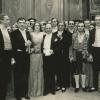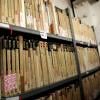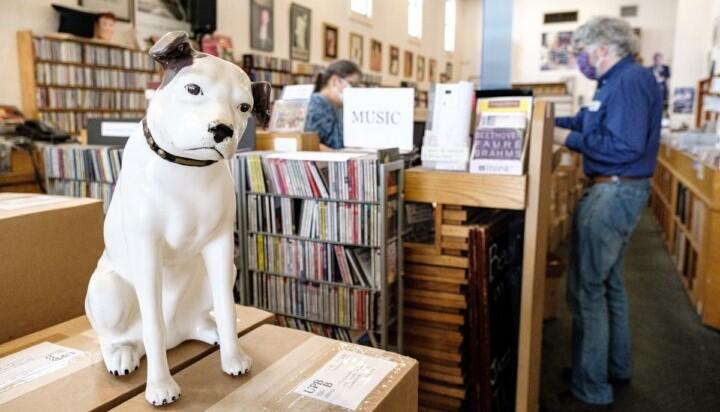
The collector proposes, the world disposes. Often frustratingly, painfully.
If among your treasures are music cylinders, cassettes, cartridges, CDs, or DVDs, there’s no bad ending when it comes time to sell them, give them away, or dispose of them — except one. They must not end up in a landfill, but increasingly, they do.
Whether moving to a smaller home or just wanting more space or doing your own or somebody else’s “death cleaning,” the disposition of “stuff” has been a universal problem ages before the appearance of Marie Kondo (and long after she herself changed her mind about throwing out everything that doesn’t “spark joy”).
A month ago, a Facebook post created much attention and discussion:
“The music portion of the Notre Dame de Namur library, comprising over 10,000 books, is going to be destroyed soon, as they haven’t been able to get another library to take them. So everyone is invited to come take them.”
There followed a long and detailed list of what would be destroyed, from Dover scores to piano reductions to Broadway piano/vocal scores to solo music for all instruments, and a repeated warning: “Feel free to pass on the word — anything remaining of the collection will be destroyed.”
Responding to a query from SF Classical Voice over the weekend, Randall A. Sessler, Notre Dame de Namur University’s dean of student academic success, wrote in an email:
“The library is now under my purview. I responded directly to over 300 emails and voicemails, many of which featured unwarranted profanity and personal attacks.
“I can tell you that the message about the library’s music collection being destroyed was never accurate. As the new leader of the library, I am working with new staff members to completely redesign and enhance the library.
“I am also working with our controller, CFO, reference librarian-archivist, and campus stakeholders to determine the best way to utilize our library’s music holdings. We are exploring a variety of options with an eye on preserving the music collection and making it available — digitally and physically — to a wider audience.
“This process is going to take some time, but please know that, as I said in my Facebook post, destroying library materials is unconscionable and was never the plan.”
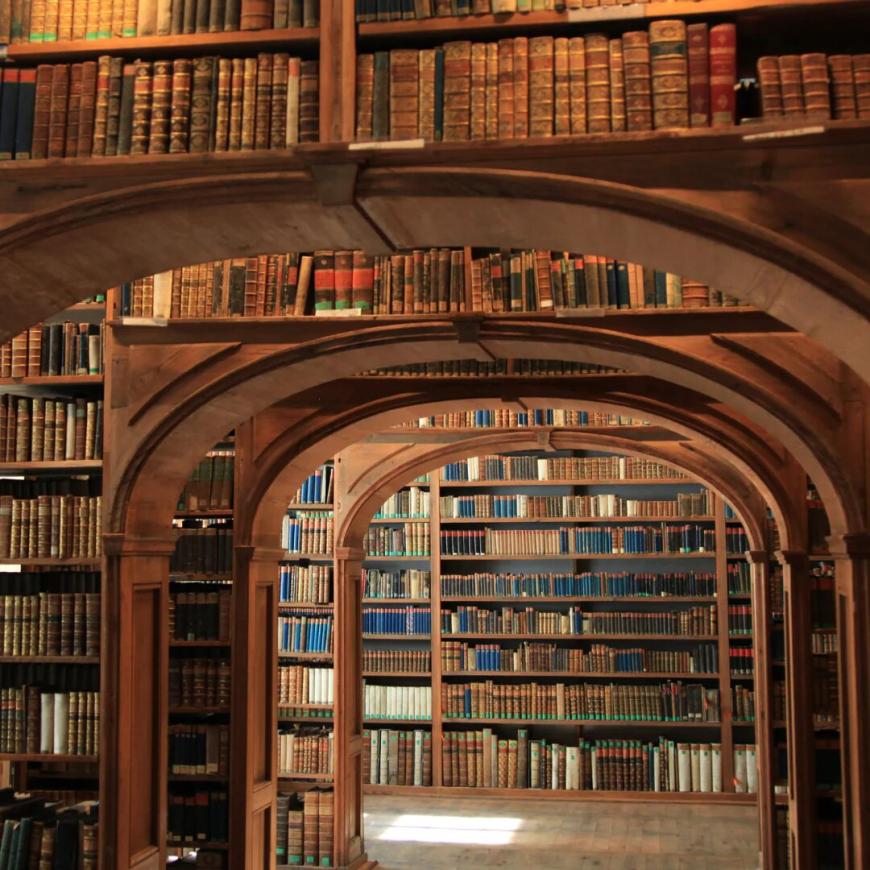
Inexcusable as profanity and personal attacks are, the alarm and upset about the possibility of the destruction of library material is understandable in some sense — if a library is no longer a safe harbor, what is?
Until a decade or so ago, most public and school libraries routinely accepted DVDs, CDs, and records (yes, the vinyl ones, which went from valuable to nothing to newly valuable again), but that’s often no longer the case.
Some recycling firms still accept bags or boxes of polycarbonate plastic discs for free or at a small charge, which can then be broken up and mixed with asphalt for paving roads. Heartbreaking, but not a complete waste.
To be sure, there is a bigger emotional-existential issue here than just the physical relocation of a music or video collection.
Larry Tubelle, 92, chief film critic for Variety in the 1950s and 1960s, told SFCV:
Much has been written about the common experience of sons and daughters who must sift through the personal belongings of a parent who has just passed away. In literature and in film, it tends to be depicted as something ranging anywhere from bittersweet to melancholy to heartrending. Whereas in life itself, depending upon the abundance of the material possessions as well as the memorabilia, tedium can easily set in.
The dark side is the realization that seemingly precious possessions and mementos have lost their luster over the years. Suddenly, yesterday’s treasure is today’s garbage.
That collection of Brunswick and Decca recordings by Bing [Crosby] from the 1930s, when his voice was robust and daring — you haven’t played them since you threw away the phonograph. Maybe, just maybe, one of the kids will want them, at least for sentimental reasons? Nah. Throw them away.
Nobody’s going to want all those DVDs rotting away in the big cardboard box in the garage: City Lights, To Kill a Mockingbird, The Philadelphia Story, An American in Paris. Scrap heap.
As you sift and toss, the inescapable conclusion comes into focus. The truth that slowly, imperceptibly, time has caught up with you. The process of getting, spending, collecting, compiling, composing, recording — a process that seemed so significant — seems now, somehow, suddenly meaningless.
What you didn’t realize as you were saving and preserving all those treasures was that those to whom you mattered so much, those loved ones with whom your life intersected daily, intimately, would one day, understandably, be so preoccupied with their own lives, their own families, their own destinies, that yours would fade into an irrelevant background. As would the by-products of that dreamlike, sepia-toned past.
And it occurs to you [that] what you are really in the process of throwing away is yourself.”
At the other extreme are those who don’t see a problem. A former bookstore owner, world-class reader, and collector, with two households of floor-to-ceiling books and music, told SFCV:
“The fact is that most of the stuff I’ve accrued I’ve done for the joy of it and have enjoyed them for what they are. My CD and DVD collections are personal and likely have little or nothing to demand either value or interest in them beyond casual and in passing — they won’t be dumped or destroyed.
“The books, that’s more complicated. There is a lot of dross there, and I know it. But it’s not specialist niche-market stuff mostly. My collecting focused on popular fiction, and genre fiction, and that is still and forever in high demand.
“The more I thought about this, the more I realized that not having the need to dispose of the stuff, either financially or for the space, means they can be disbursed correctly over time.”
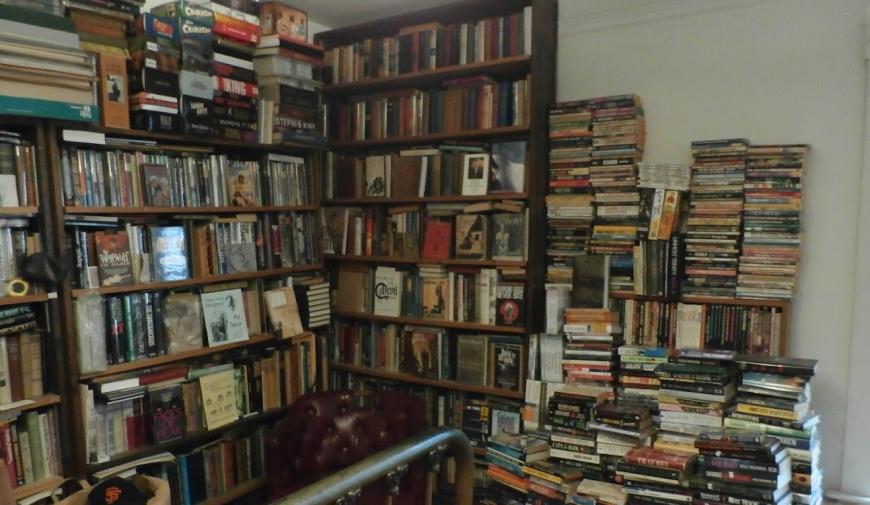
Still, it’s hard to be sanguine about splitting up a personal library. Some years ago, a huge recording collection, such as that of the late SFCV founder Robert Commanday, would be taken with thanks by a philanthropic organization. Today, arrangements like that are made difficult by the time and trouble of finding buyers for recordings in large quantity.
But if you’ve ever recorded music yourself — on cassettes, CDs, or mini- or microcassettes — there’s no way to preserve that material, however rare and important.
In practical terms, when you are faced with the problem of disposition — what do you do?
The San Francisco Environment Department has a long list of possible sites to “recycle or safely dispose of items by using a take-back service or a drop-off location near you.” But when you try the sites by calling or visiting, there are often temporary or permanent changes in accepting discs.
When it comes to the city’s major garbage collector, Recology, the place for discs is the black or gray container, “limited to waste that is not organic or recyclable.”
A major ongoing post-pandemic possibility in and around San Francisco is to donate to Friends of the San Francisco Public Library, which, alas, has a limit of “20 boxes or 30 bags of items.” Rather than the huge annual three-day sales of the past, the library now holds smaller monthly sales at various locations. Friends of the SFPL says:
“In addition to books, we accept comic books, CDs, DVD and Blu-ray, vinyl, computer and video games, and books on CD. We are always looking for popular and perennial titles in good condition. We are also eager to receive technical, academic, and collectible books that we can sell through our eBay and Amazon storefronts. We accept books in all languages.
“We ask that you not donate books that are moldy, water-damaged, musty from long storage in a garage or basement, heavily highlighted or underlined, showing signs of insect or rodent infestation, or smelling of tobacco.
“We do not accept encyclopedia sets, magazines, VHS or cassette tapes, artwork, clothing, or household items. Nor do we accept former library books with call numbers, card pockets, and the like.”
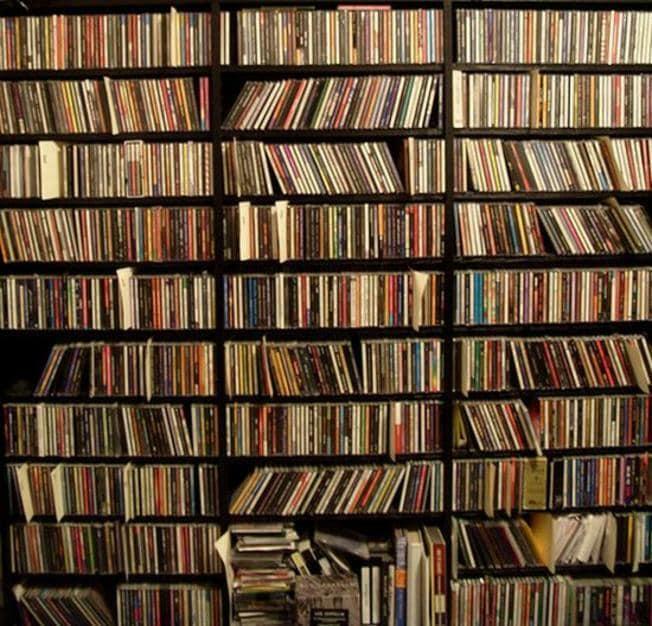
A widely known store with locations in Berkeley and San Francisco that still sorts through records, CDs, and DVDs and actually buys some of them for store credit is Amoeba, “the world’s largest independent record store.”
Are they still open? Su Buchignani and several other local musicians say, “We go to Amoeba fairly regularly, so the answer is a resounding ‘yes.’”
Parker Monroe writes: “The Berkeley Amoeba location still has a little space for classical, but it’s much smaller than it was. There used to be a small room upstairs where classical music played and was a lovely sanctuary. The footprint for classical in San Francisco has been the same for quite some time. Don’t forget The Musical Offering on Bancroft, also still in business.”
Marika Kuzma suggests looking for “schools among underserved populations. I have a colleague who teaches music in a Catholic elementary school and created an archive; his students love the LPs. He even has a collection of polka music.
“A friend works in a Native American area in South Dakota and says their school libraries are sometimes lacking in materials. Of course, you might need to check if the school has the equipment to play the stuff.”
Singer Sue Hinshaw says, “I had a dilemma figuring out what to do with my opera scores. I had so many — many more than most music stores. I asked to donate them to the Portland Library, but there was little interest.
“I ended up donating 26 boxes to Linfield University and a friend of mine who teaches voice there. I know they’re in good hands and will be used, and that was a relief to me. I’ve treasured those scores for years, and it was difficult to part with them.”
From Sieglinde Walse: “We have a store near here, Jack’s Music Shoppe, in Red Bank, New Jersey, that will buy CDs and such and resell them. I have to call them and ask if they limit the genres in which they deal, as I am considering reducing my collection in the near future.
“Libraries generally haven’t got the room to accept stuff like that. I think Housing Works in New York City does, or did, last time I asked. Or perhaps a local school with a robust music program, if such exists anymore.”
Another possibility: popsike.com, which advertises, “What Is the Value of Your Vinyl Records? Use Our Archive of 25 Million+ Auctions as a Vinyl Price Guide.”
How widespread is the problem of giving personal treasures away? Even the Library of Congress has to tackle it, maintaining the Surplus Books Program, which makes donations available to educational institutions, public bodies, and nonprofit tax-exempt organizations in the United States.



